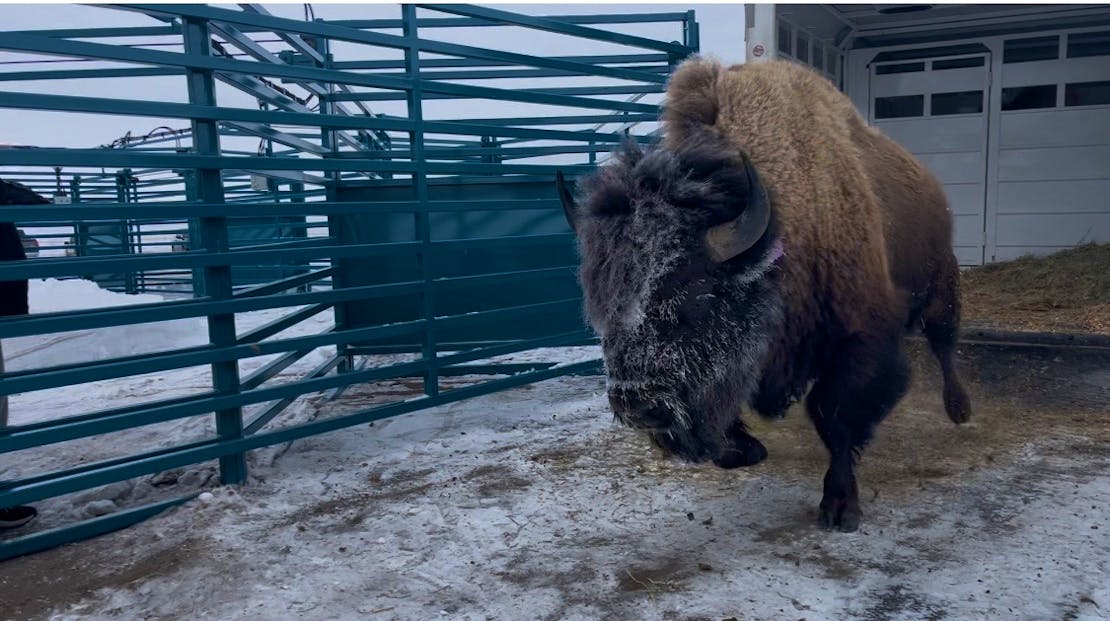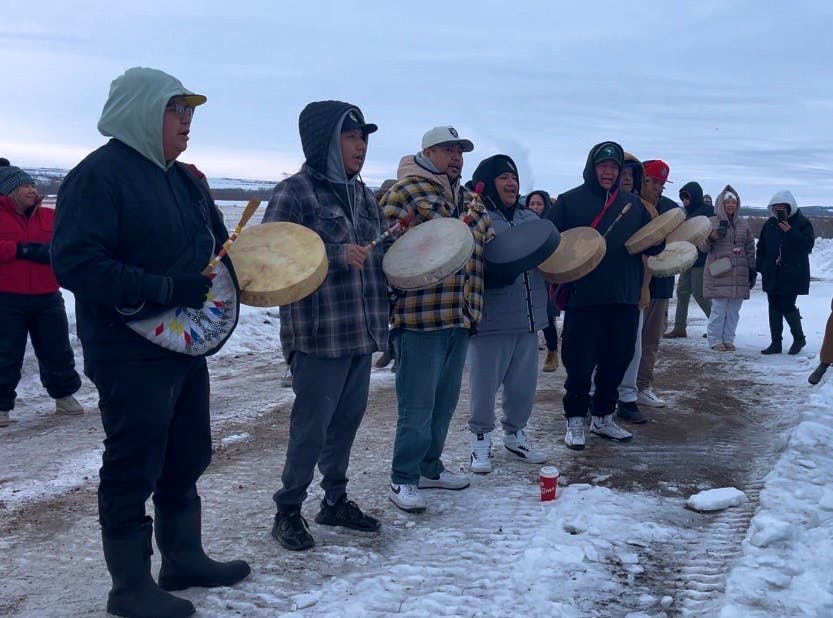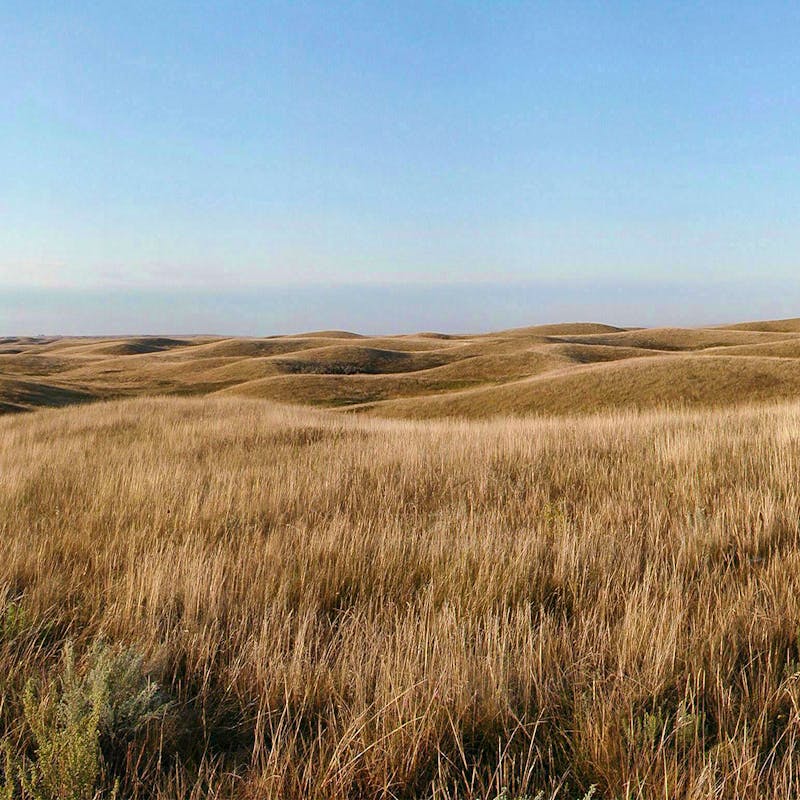Tweet“The transport of these Yellowstone bison is as beautiful as it is significant. It’s a tremendous honor to have a role in getting these bison tested, transported and safely to the home they deserve.”
A family group of Plains bison were moved across the U.S.-Canadian border this week as a gift from the Fort Peck Tribes in Montana to Mosquito Grizzly Bear’s Head Lean Man First Nations in Saskatchewan, marking the first time bison from Yellowstone National Park have crossed into Canada. The transfer took place as part of the Buffalo Treaty which was established by Indigenous nations across North America to collaboratively restore buffalo to their lands.
“It’s an exciting time, returning our genetically pure relatives from Yellowstone across our invisible boundary that they once roamed freely,” said Lewis Matthews, Chief of Police at Fort Peck Tribes. “Those days of free roaming have been long gone but the American bison is continuing to be placed back in their native lands. These bison will provide traditional reconnection as they did in the past.”
The small herd includes 11 bison that were first brought to Fort Peck in 2024 from Yellowstone National Park. The family group includes three bulls, seven cows, and one calf — all of Yellowstone genetics — for the benefit of generations of bison and Indigenous peoples. These animals underwent final federal disease testing and were cleared by both Canada and the U.S. for the 700-mile journey by caravan, facilitated by an agreement between the Fort Peck tribes and the Mosquito First Nation, along with the International Buffalo Relations Institute. The herd will be accompanied by members of the Pte’ Group from Fort Peck, leadership from Mosquito First Nation, and Indigenous peoples from other nations.
“From one tribal nation to another, it has been an honor to have been an intermediary in the process of caring for our buffalo relatives,” said the Pte’ Group. “Our relatives will help renew the tribe's relationships, spirituality, mental, physical and emotional health. It epitomizes the intent of the Buffalo Treaty.”
Mosquito, Grizzly Bear's Head Lean Man First Nation welcome these buffalo for the same reason many others have welcomed restored herds — to establish their own herd for cultural, spiritual and economic revitalization. The return of bison to the plains is important for Indigenous food sovereignty, the renewal of culture and the ecological benefits that bison provide to prairie grasslands.
“The gift of the buffalo to us from Fort Peck Reservation is a wonderful demonstration of our shared history and cultural practice of gifting” said Chief Tanya Stone of Mosquito First Nation. “These buffalo are coming to us as a family group led by a matriarch. This beautiful gift is deeply meaningful as we collectively rebuild our relationship to them as they teach us perseverance, strength, and determination.”
Fort Peck is one of the original signatories of the Buffalo Treaty, signed between nations who commit to buffalo restoration and consciousness. Mosquito signed in 2022.
“A traditional gifting economy was once practiced by the First Nations living on the Great Plains of North America,” said Dr. Leroy Little Bear, on behalf of the Buffalo Treaty. “This present-day gifting of Yellowstone buffalo by Fort Peck, who were one of the original signatories of The Buffalo Treaty, is a continuation of this gifting economy. And Mosquito First Nation, also a signatory, as the recipient of this special gift, shows that both nations are implementing the intent of the Buffalo Treaty: which is cooperation, renewal, and restoration of the Buffalo.”
The animals’ 700-mile road trip to the Mosquito First Nation could only occur after final brucellosis and tuberculosis testing, the latter of which is required by Canadian officials. Disease testing and a transport plan were finalized by Indigenous partners, and government and nongovernment organizations united by the goal of seeing the bison safely to the Mosquito First Nation.
“The transport of these Yellowstone bison is as beautiful as it is significant,” said Chamois Andersen, Rockies and Plains senior representative with Defenders of Wildlife. “It’s a tremendous honor to have a role in getting these bison tested, transported and safely to the home they deserve.”
“We are proud to work with so many individuals and organizations to transfer Yellowstone buffalo to tribes throughout the country and now Canada,” said Becky Bigelow, Wildlife Biologist with USDA APHIS Veterinary Services. “We are a part of a large cooperative, and it is satisfying to see all the hard work pay off for buffalo and the nations receiving them. It is always exciting to have a role in something so meaningful.”
Plains bison recovery to Indigenous lands is crucial to the overall recovery of the species. Since 2019, more than 400 bison have been transferred to 26 tribes across 12 states thanks to the Yellowstone BCTP. Other transfers in Canada include bison to Indigenous lands from Elk Island National Park, Grasslands National Park and Old Man on His Back.
Plains bison are considered “ecologically extinct,” meaning the species' overall population is so low it can no longer play a significant role in its ecosystem, having been hunted to the brink of extinction by the early 1900s. The population has gradually grown to a stable level of around 50,000 wild bison today, with many more managed for agriculture.
For over 75 years, Defenders of Wildlife has remained dedicated to protecting all native animals and plants in their natural communities. With a nationwide network of nearly 2.1 million members and supporters, Defenders of Wildlife is a leading advocate for innovative solutions to safeguard our wildlife for generations to come. To learn more, please visit https://defenders.org/newsroom or follow us on X @Defenders.
Media Contact
News

Study Led by Defenders of Wildlife Scientist Shows Noise Pollution Impacts on Migratory Birds






